Your cart is currently empty!
Organic cannabis cultivation is not just a growing trend; it’s a commitment to nurturing healthier plants while being mindful of environmental impacts. By focusing on natural fertilizers, compost, and eco-friendly pest control, growers can achieve thriving yields without relying on harmful synthetic chemicals. In this guide, we’ll explore the best practices for cultivating organic cannabis, emphasizing sustainability and soil health.
Building a Healthy Soil Ecosystem
The foundation of successful organic cannabis cultivation lies in the soil. A robust soil ecosystem supports plant health and aids in nutrient uptake, ultimately leading to healthier cannabis plants.
- Compost: Use organic compost to enrich the soil with essential nutrients and beneficial microorganisms. Composting organic matter like food scraps and yard waste can create a rich humus that feeds your plants naturally.
- Cover Crops: Implementing cover crops such as clover or vetch can improve soil structure, prevent erosion, and add nitrogen naturally.
- Mulching: Apply a layer of organic mulch to retain moisture, regulate soil temperature, and promote microbial life.
Nurturing Plants with Natural Fertilizers
Organic fertilizers provide essential nutrients to cannabis plants without the drawbacks of chemical alternatives. Here are some popular natural fertilizers:
| Fertilizer | Benefits |
|---|---|
| Bat Guano | Rich in nitrogen and phosphorus, promoting vigorous plant growth |
| Worm Castings | Enhance soil aeration and moisture retention, and provide a slow-release nutrient source |
| Fish Emulsion | Provides a quick boost of nutrients when plants need it most, with a balance of N-P-K |
Integrated Pest Management (IPM)
Using natural methods to manage pests is crucial for maintaining an organic grow. Integrated Pest Management (IPM) focuses on ecosystems management to minimize pest damage:
- Beneficial Insects: Introduce predatory insects like ladybugs and lacewings to control aphid and mite populations.
- Companion Planting: Grow companion plants such as marigolds and basil that can naturally repel pests.
- Neem Oil: Apply neem oil as a natural pesticide that doesn’t harm beneficial insects when used appropriately.
The Benefits of Organic Cannabis
Organic cannabis cultivation offers numerous benefits for both the environment and consumers:
- Environmental Impact: Reducing chemical runoff protects local ecosystems and promotes biodiversity.
- Healthier Plants: Organic methods result in stronger, more resilient plants with better disease resistance.
- Consumer Health: Avoiding synthetic chemicals means cleaner, safer cannabis for consumers.
Conclusion
Organic cannabis cultivation is a path toward sustainability and superior quality. By building healthy soil ecosystems, using natural fertilizers, and implementing IPM strategies, growers can support their plants without the need for harmful chemicals. The benefits of organic growing extend beyond the individual crop, fostering a healthier environment and providing high-quality cannabis products for discerning consumers. Embrace the organic movement to cultivate cannabis sustainably and responsibly.
Discover more from Magic Clones
Subscribe to get the latest posts sent to your email.


Leave a Reply